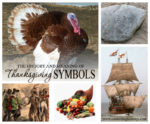Pilgrims

William Bradford, governor of the Plymouth colony, is generally credited with being the first to use the term pilgrim to describe the Plymouth colonists. However, his use of the term referred specifically to members of his church and not to the larger group of settlers.
Bradford wrote the following words about his church’s departure to America (recall that they had left England and had been in Holland for 12 years):
“So they left that goodly and pleasant city which had been their resting place near twelve years; but they knew they were pilgrims, and looked not much on those things, but lift up their eyes to the heavens, their dearest country, and quieted their spirits” (Bradford’s History of the Plymouth Settlement, p. 49).
After Bradford’s use of the word pilgrim, it was rarely used. The first documented use of the term (other than a few references which paraphrased Bradford’s words) was not until a 1798 celebration of Forefather’s Day in Boston. A few years later, in 1800, it was used prominently in the Forefather’s Day celebrations. Over time, it continued to gain popularity and eventually came to refer to all of the original Plymouth colonists.
The pilgrims are usually depicted in black and white with buckles on their hats, garments and shoes, but this is not an accurate image. According to the History Channel:

“Buckles did not come into fashion until later in the seventeenth century and black and white were commonly worn only on Sunday and formal occasions. Women typically dressed in red, earthy green, brown, blue, violet, and gray, while men wore clothing in white, beige, black, earthy green, and brown” (history.com).
To learn more about Plymouth Colony clothing, visit: Plimoth on the Web or Sail 1620.org.
To learn more about the Pilgrims and the Plymouth Colony, visit Mayflower History.com — this site even offers biographies of every passenger on the Mayflower.
Back to main Thanksgiving Symbols page.
We welcome your questions and feedback. If you are seeking information on thanksgiving symbols that is not found on our website, please contact us.
This content has a copyright © 2011 by Angie Mosteller. Please cite the source if you use this material: http://www.celebratingholidays.com/?page_id=4182.






